In today’s fast-paced world, mindfulness in art presents a unique way to achieve creative calm. By blending artistic endeavors with mindfulness, you foster a deep connection with your creative potential. This approach not only enhances your artistic expression but also supports your mental health. Picture beginning each day with a calming art session; it engages your senses and clears your mind, leading to profound clarity. Adopting this habit can improve your creative process and support your inner artist in a peaceful environment. For deeper insights into this fascinating blend, explore this resource on creativity and mindfulness.
Key Takeaways
- Mindfulness practices can significantly boost creativity.
- Starting your day with art enhances innovative thinking.
- Meditation quiets the mind and fosters creative clarity.
- New hobbies can catalyze growth in artistic inspiration.
- Immersing in sensory experiences inspires creative ideas.
- A personalized creative space facilitates smoother artistic flow.
The Intersection of Mindfulness and Art
The connection between mindfulness and art forms a unique space. Here, art therapy emerges as a powerful tool for personal growth and healing. Through art, you can fully engage with the present moment, unlocking your ability to express emotions creatively. This blend leads to a state of calm and focus, turning the act of creating into a journey of self-discovery.
Exploring the Synergy Between Creativity and Calm
Engaging in creativity through mindfulness transforms art into a tool for inner peace. The practice of meditation in art immerses you in textures, colors, and movements. It deepens your connection with your thoughts and feelings. This approach positively impacts emotional well-being, reducing stress and enhancing mood during and after art-making.
Art as a Reflective Journey
Seeing art as a reflective journey allows you to delve into your inner world while fostering personal growth. Each brushstroke can be a form of meditation, connecting you with deep emotions and thoughts. Art therapy provides a pathway to profound healing, enhancing awareness and introspection. Through creativity through mindfulness, you develop a vital emotional tool for navigating life’s challenges.
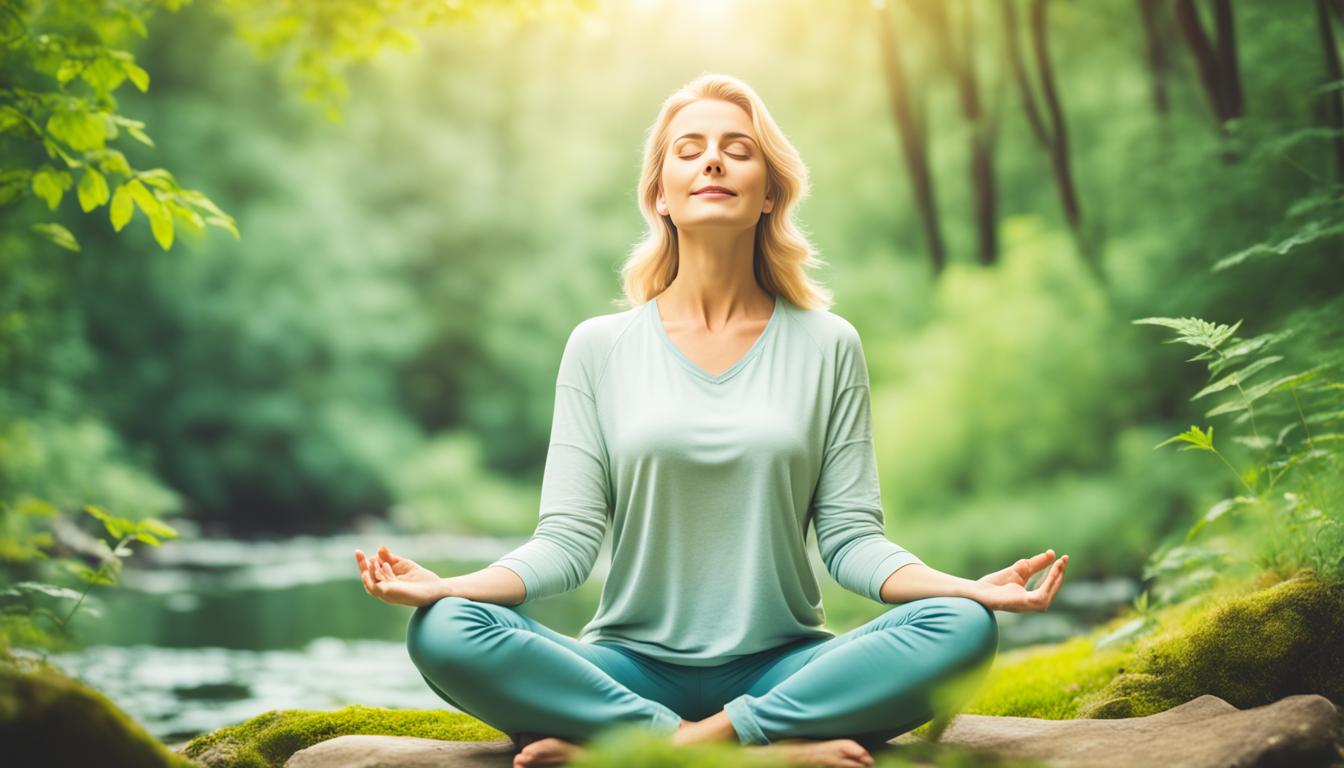
Understanding Mindfulness
Mindfulness is a practice that focuses on being fully present and engaged in the current moment. It draws from ancient traditions but has become crucial in modern life, affecting healthcare, education, and corporate settings. By understanding mindfulness, we see its impact on daily life, improving mental health and emotional well-being.
Defining Mindfulness in Everyday Life
At its core, mindfulness is about focusing on the *here and now*, without distractions or judgments. Many find that engaging in art offers a unique way to practice mindfulness, fostering a deeper connection with the present. Activities like sketching, crafting, or mindful photography turn ordinary moments into experiences of profound presence.
The Importance of Being Present
Being present is vital for reducing stress and increasing joy. It creates a space for self-awareness and managing emotions. Art, through methods like Body Scan Drawings or Intuitive Painting, can deepen this awareness. Studies indicate that art activities stimulate brain regions associated with relaxation and meditation, highlighting the benefits of mindfulness in daily life.
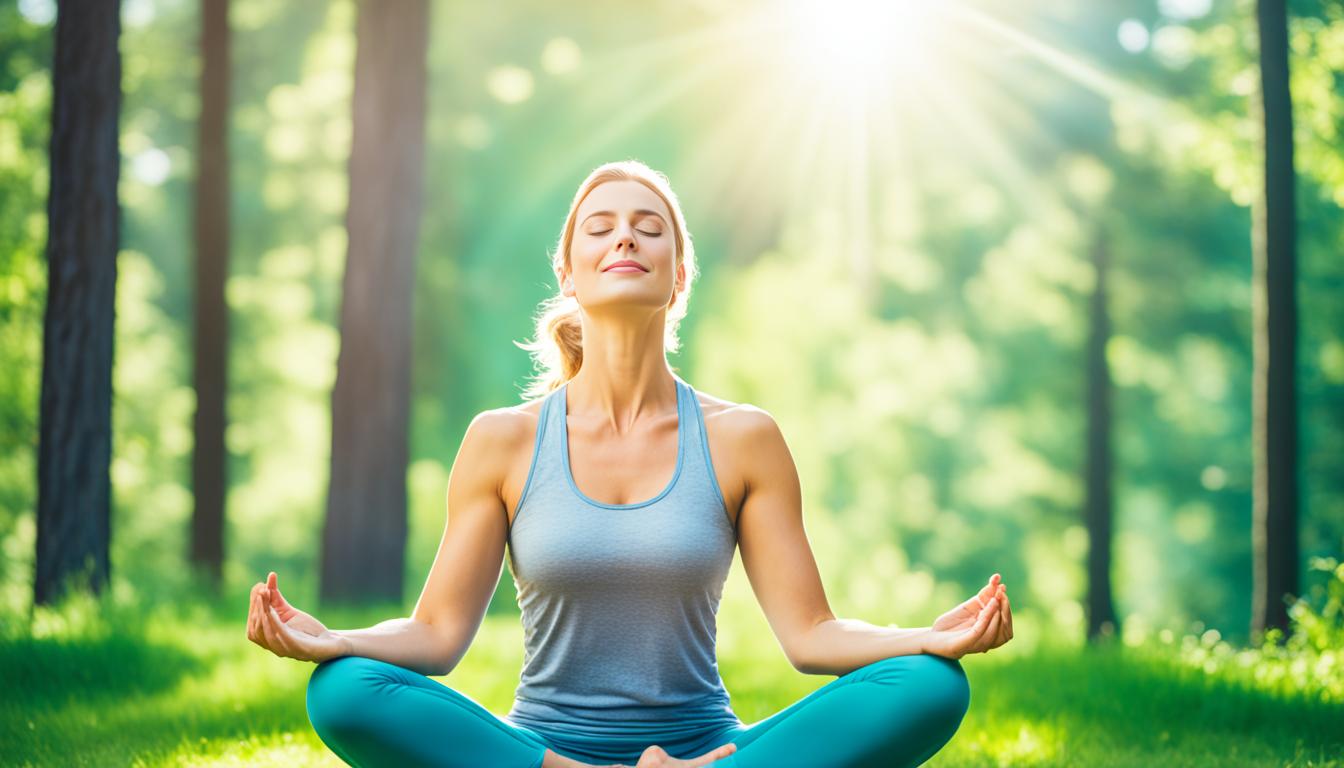
Mindfulness in Art
Integrating mindfulness into your artistic pursuits offers profound benefits for creative expression. By embracing mindfulness techniques in art, you unlock a powerful avenue for emotional processing and stress relief. Engaging in activities like mindful art journaling can become a transformative practice in your life, bridging the gap between self-reflection and creativity. Programs such as Mindful Monday and Art & Meditation at institutions like LACMA illustrate the significant therapeutic benefits of art, demonstrating how artistic endeavors enhance your well-being.
The Benefits of Creative Expression
Creativity through mindfulness not only enriches your artistic skills but also facilitates emotional regulation. Research indicates that immersing in art activities can help alleviate physical symptoms of stress. Galleries often recommend spending around 5 to 10 minutes or even an hour mindfully experiencing a work of art, allowing you to absorb its nuances profoundly. For instance, the exhibitions at LACMA, such as New Abstracts and Another World, feature intricate works that encourage thoughtful engagement, contributing to a deeper understanding of your feelings and thoughts.
Therapeutic Advantages of Mindful Art Practices
Mindful art practices serve as a powerful therapeutic resource, granting you the freedom to express complex emotions nonverbally. Engaging with art not only invites personal growth but also helps weave mindfulness into everyday experiences. Techniques such as the Developing Mindfulness Guidebook offer insights into establishing a mindful routine, including guided meditations and art therapy exercises that cultivate self-compassion. By applying these strategies, you can reap the therapeutic benefits of art, significantly improving your mental well-being.
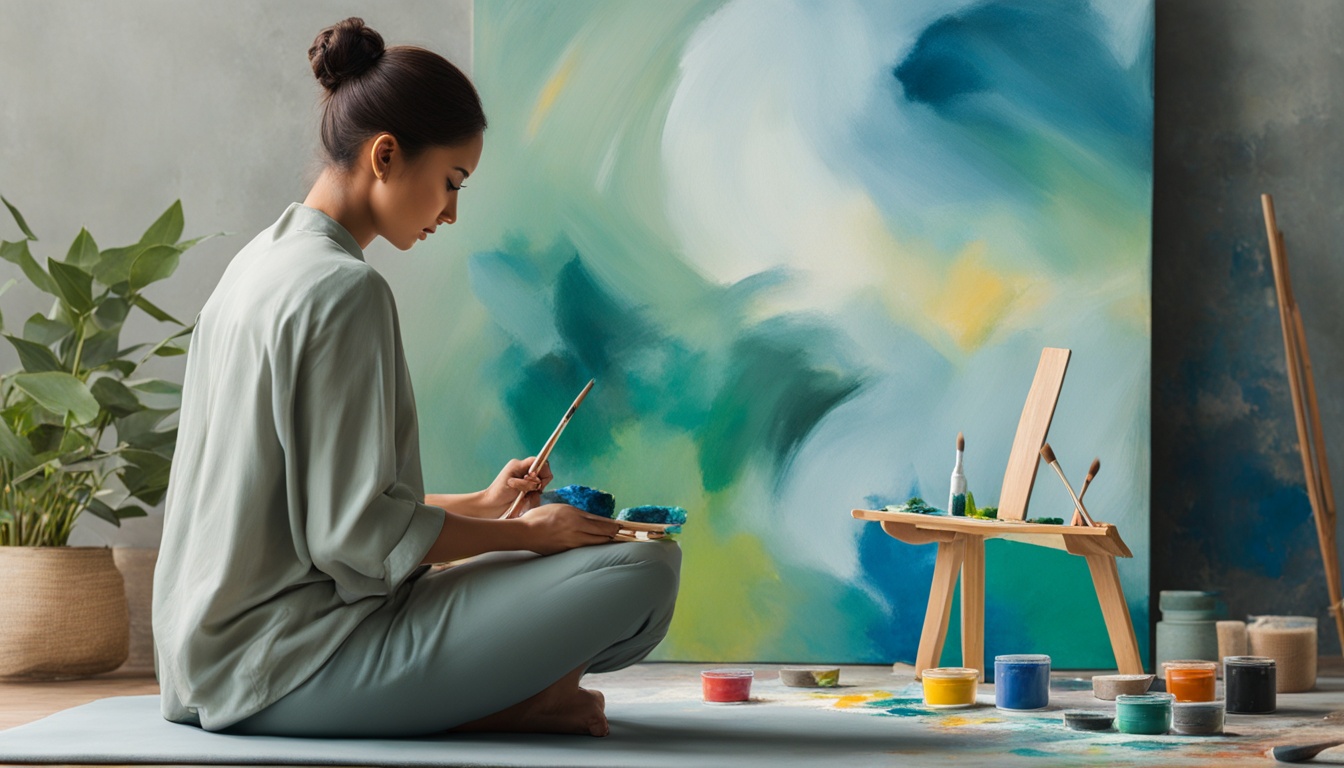
Art as Meditation
Art can go beyond mere creation, becoming a meditation that deepens the connection between the artist and their work. Through mindful art creation, you shift focus away from distractions, channeling energy into the creative process. This immersion often leads to a state known as “flow,” where time disappears, and your mind finds tranquility. The act of creating art becomes a powerful vehicle for mindfulness and calm, benefiting both your artistic expression and mental well-being.
Transforming Creation into a Meditative Process
When you approach art with intention, each stroke or line becomes a meditation in art. Like the Rubin Museum of Art, which integrates meditation sessions and workshops, creating art cultivates a deeper connection to each piece. Focusing on one artwork for an extended period during National Slow Art Day allows you to immerse yourself in the colors, shapes, and emotions, quieting your thoughts and enhancing mindfulness.
Fostering Mental Well-Being Through Art
Creating art is a profound tool for mental well-being. Mandalas symbolize wholeness and offer a structured method for artistic exploration. By starting with basic shapes and filling them with color, you encourage creativity and mindfulness. The repetitive nature of mandala creation acts as a calming ritual, grounding you in the present moment. Exploring materials and patterns allows for personal expression while nurturing an emotional state conducive to relaxation and focus.
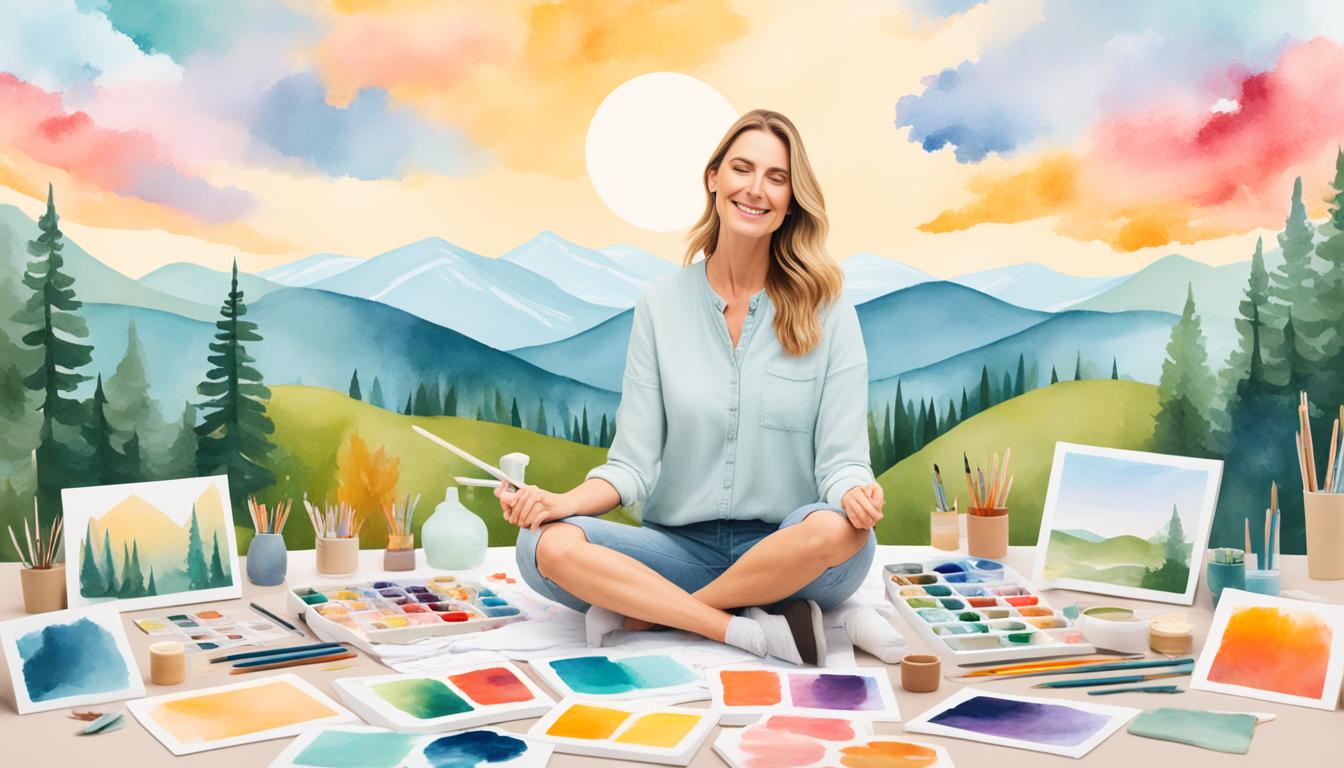
Art Therapy and Healing
Art therapy is a powerful tool for those seeking emotional clarity and healing. It harnesses creativity as a means for deep emotional expression. By delving into various artistic mediums, you can uncover feelings that often lie beneath the surface. This process of art therapy aids in communicating innermost thoughts and emotions, fostering a deeper grasp of personal experiences.
Using Art for Emotional Expression
Art therapy offers a unique way to express emotions that might be too complex for words. It creates a space where feelings emerge with less hindrance. Activities like painting, drawing, or sculpting allow for a non-verbal journey through your emotional terrain. This can be incredibly cathartic for those dealing with anxiety or trauma, showing how art is seen as a reflective practice by mindfulness artists.
The Role of Art Therapists in Promoting Mindfulness
Art therapists are essential in guiding individuals through their artistic journey, keeping the focus on the present. They integrate mindfulness techniques to help you stay centered and aware while creating. This approach to art therapy facilitates emotional healing by deepening your emotional understanding. It promotes self-reflection and acceptance, creating a supportive environment for personal growth.
Mindful Art Practices
Embracing mindful art practices offers a fulfilling path to enhance mindfulness in art. This journey engages your creativity and encourages sensory exploration. By fully immersing yourself in the artistic process, you cultivate a deeper awareness and connection between your body and mind.
Engagement Through Sensory Exploration
Engaging your senses during art creation adds depth to your work. Interacting with materials, colors, and textures enhances mindfulness in art. Activities like the inchies challenge and weekly free slow drawing workshops allow you to explore mediums mindfully.
Connecting Body and Mind During Creation
Art creation becomes intimate when focusing on the body-mind connection. Activities like authentic movement promote deep introspection and tranquility. Joining workshops or the online membership, The Gathering, connects you with artists seeking mindfulness. Each art form, from dance to fluid art, helps regulate emotions and improves well-being.
Enhancing Mindfulness in Art
In the realm of art, enhancing mindfulness is crucial. By integrating specific mindfulness techniques, you unlock deeper artistic awareness and emotional depth. These techniques include breathwork, intentional focus, and setting up a mindful space for creativity.
Techniques for Deepening Artistic Awareness
Adopting mindfulness in art can revolutionize your creative process. Techniques like breathwork and body scans foster a state of calm. This state grounds your thoughts, deepening your connection with your art. Being fully present during mindful art creation not only boosts awareness but also sparks innovative ideas and emotional clarity.
Creating a Mindful Environment for Art
Creating a space free from distractions is key to enhancing mindfulness in art. Adorn your creative space with soft lighting and soothing colors. This environment fosters inspiration and supports your well-being. Incorporating art into daily life leverages mindfulness techniques in art for stress reduction and creative growth. For more on mindfulness practices, explore this guide.
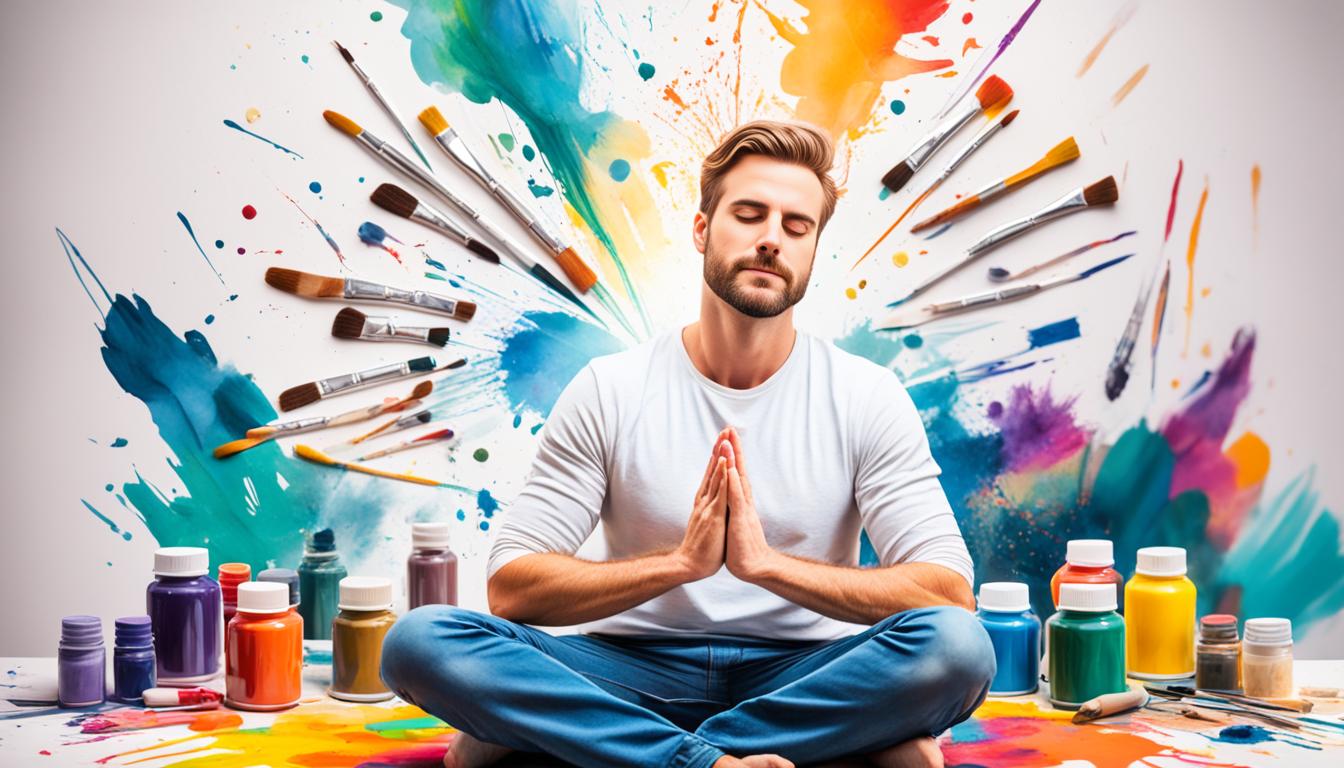
The Role of Artists in Mindfulness
Contemporary mindfulness is crucial for many artists today. It helps them deepen their creative process. By using mindfulness, artists can tap into deeper inspiration and follow a more genuine creative path.
How Contemporary Artists Integrate Mindfulness
Many artists today see mindfulness as key to their work. They use meditation and reflection to slow down and boost creativity. Studies show that mindfulness makes thinking more flexible and innovative.
This shift helps artists find new ideas and unique ways to express themselves in their art.
Personal Narratives of Artistic Mindfulness
Artists’ personal stories show how mindfulness changes their creative process. They often talk about breaking through creative blocks caused by their own pressures and societal expectations. By focusing on the present, they create a space for true self-expression.
Their stories reveal how mindfulness not only improves their art but also deepens their connection with viewers. This makes their work more impactful.
Practical Application of Mindfulness Techniques in Art
Integrating practical mindfulness into your art practice can simplify your creative journey. By focusing on the present moment, you open yourself up to a deeper connection with your work. This approach encourages you to explore mindful art creation, which enhances your overall artistic experience. By lowering distractions and fostering awareness, you can nurture an environment conducive to self-expression.
Simplifying Mindfulness for Creative Journeys
To begin with, take small steps toward incorporating practical mindfulness into your daily routines. Simple techniques such as breathing exercises or grounding your senses can anchor you in the moment. Aim to engage fully in each art activity, whether it’s painting or sculpting. Allow yourself to focus on the process rather than the final product. Embrace the idea that there are no mistakes, just opportunities for growth and learning.
Overcoming Challenges in Mindful Art Practices
Every artist faces challenges, such as perfectionism or self-doubt. Acknowledging these feelings is the first step in overcoming creativity challenges. Practice self-compassion and recognize that imperfections are part of the artistic journey. Strive to appreciate your unique expression without harsh judgment. Mindful art creation allows you to reflect on these challenges, transforming them into a source of inspiration rather than obstacles.

Scientific Insights: Benefits of Mindfulness in Art
The study of mindfulness in art uncovers deep links between creativity and emotional health. Studies show that engaging in creative pursuits boosts mental health by fostering relaxation and emotional release. This research underscores the profound benefits of mindfulness, especially in the realm of art and mental health, pointing to its role in enhancing psychological well-being.
Research Findings on Art and Mental Health
Recent research highlights the efficacy of Mindfulness-Based Art Therapy in reducing depression and stress. A study with 10 individuals found that eight art therapy sessions, each lasting 180 minutes, yielded significant outcomes. The Wilcoxon Signed-Rank Test revealed a marked decrease in depressive symptoms and stress levels. However, the program showed limited impact on anxiety levels.
Expert Opinions on Mindfulness Techniques
Experts recommend incorporating mindfulness techniques into artistic endeavors. They argue that mindfulness in art stimulates brain regions linked to relaxation, highlighting its therapeutic potential. Experts propose that future studies should include a more diverse population, as current research mainly focuses on specific conditions like cancer. Broadening the scope can deepen our understanding of mindfulness and creative expression’s profound effects.

Conclusion
The exploration of mindfulness in art uncovers deep paths to creativity and emotional peace. By embracing the strategies and insights discussed here, you can forge a deeper connection with your artistic side. This enriches not just your creative endeavors but also your mental health. The advantages of creative mindfulness go beyond mere beauty; they lead to a deeper understanding and healing in both personal and societal realms.
Historical movements like the Renaissance and Romanticism set the stage for exploring inner themes and nature. This has shaped how artists approach their work today. The dialogue between mindfulness and art continues to grow, with new technologies like virtual reality offering deeper sensory experiences. By incorporating these practices into your daily routine, you can embark on a more peaceful and rewarding artistic journey.
For both seasoned artists and those just starting, the transformative impact of mindfulness in art can lead to artistic calm. Adopting this philosophy can reshape not only your artistic expressions but also your overall well-being. The future of creativity awaits, promising a richer exchange between you, your audience, and the art that unites you all.
FAQ
What is Mindfulness in Art?
How can mindfulness enhance my creative process?
What role does art therapy play in mindfulness?
Can mindfulness techniques be applied in my daily art practice?
How does creating art serve as a form of meditation?
What are the mental health benefits of engaging in mindful art practices?
How can I get started with mindful art practices?
What is the connection between contemporary artists and mindfulness?
How can I overcome challenges like perfectionism in mindful art creation?
Is there research supporting the benefits of mindfulness in art?
Source Links
- How practicing mindfulness can ease an artist’s mind – Arts To Hearts Project – https://artstoheartsproject.com/how-mindfulness-can-ease-an-artists-mind/
- Mindfulness and Creativity: Unlocking Your Creative Potential – https://www.linkedin.com/pulse/mindfulness-creativity-unlocking-your-creative-potential-smrme
- Mindfulness and Art: The Zen of Creating – Cosimo Art Blog – https://cosimo.art/blog/mindfulness-and-art-the-zen-of-creating/
- Mindfulness in Art – Best Within You Therapy & Wellness – https://bestwithinyou.com/blog/uncategorized/mindfulness-in-art/
- Colorful Calm: The Connection Between Art and Mindfulness – https://eastendarts.org/art-and-mindfulness/
- What is Mindful Art? — Mindful Creative Muse | Mindful Art Activities and Online Classes – https://mindfulcreativemuse.com/expressive-arts
- The Benefits of Mindfulness-Based Art Therapy – https://www.verywellmind.com/mindfulness-based-art-therapy-4588189
- A Step-by-Step Guide to Art and Mindfulness – https://unframed.lacma.org/2023/04/07/step-step-guide-art-and-mindfulness
- 5 Art Activities to Develop Mindfulness – https://arttherapyresources.com.au/art-mindfulness/
- A Lesson in Mindfulness – Rubin Museum of Art – https://rubinmuseum.org/art-as-meditation-a-lesson-in-mindfulness/
- Can You Meditate Through Art? – https://mindfulartstudio.com/meditate-through-art/
- Mindfulness-Based Art Therapy: A Review of the Literature – http://www.inquiriesjournal.com/articles/1737/mindfulness-based-art-therapy-a-review-of-the-literature
- Role of Art Therapy in the Promotion of Mental Health: A Critical Review – https://www.ncbi.nlm.nih.gov/pmc/articles/PMC9472646/
- Mindful Art Studio | Art journaling and mindful creation from the heart – https://mindfulartstudio.com/
- Mindful Art Activities for Kids – https://empoweringeducation.org/blog/mindful-art-activities-for-kids/
- Facing the Empty Space: Practicing Mindfulness Through Art | Mindful Art Studio – https://mindfulartstudio.com/practicing-mindfulness-through-art/
- Connecting art, mindfulness and wellbeing – https://www.stpatricks.ie/media-centre/blogs-articles/2020/september/artmindfulness
- Mindfulness and creativity: Implications for thinking and learning – https://www.ncbi.nlm.nih.gov/pmc/articles/PMC7395604/
- The Mindfulness of Art & Creativity – Creative Visions Rising – https://www.creativevisionsrising.com/mindfulness-art-creativity/
- Unlocking Creativity in the Visual Arts: Using Mindfulness and Open Awareness Meditation to Access Creative Insight – https://digitalcommons.lesley.edu/cgi/viewcontent.cgi?article=1075&context=mindfulness_theses
- Mindfulness and the Arts Therapies – https://us.jkp.com/products/mindfulness-and-the-arts-therapies
- Mindfulness Art Therapy Activities – https://www.carepatron.com/guides/mindfulness-art-therapy-activities
- Effectiveness of Mindfulness-Based Art Therapy on Healthy Quality of Life in Women with Breast Cancer – https://www.ncbi.nlm.nih.gov/pmc/articles/PMC6371662/
- The effect of mindfulness-based art therapy on psychological symptoms and happiness levels in patients with migraine: a pilot study – Current Psychology – https://link.springer.com/article/10.1007/s12144-024-05634-0
- Biobehavioral utility of mindfulness-based art therapy: Neurobiological underpinnings and mental health impacts – https://www.ncbi.nlm.nih.gov/pmc/articles/PMC7016419/
- Effectiveness of mindfulness-based art therapy for symptoms of anxiety, depression, and fatigue: A systematic review and meta-analysis – https://www.sciencedirect.com/science/article/abs/pii/S174438812031121X
- Mindfulness In Art And Literature – https://medium.com/@elastellamia/mindfulness-in-art-and-literature-d7ef95d344cc
- Engagement with the visual arts increases mindfulness – https://scholar.utc.edu/cgi/viewcontent.cgi?article=1113&context=honors-theses


